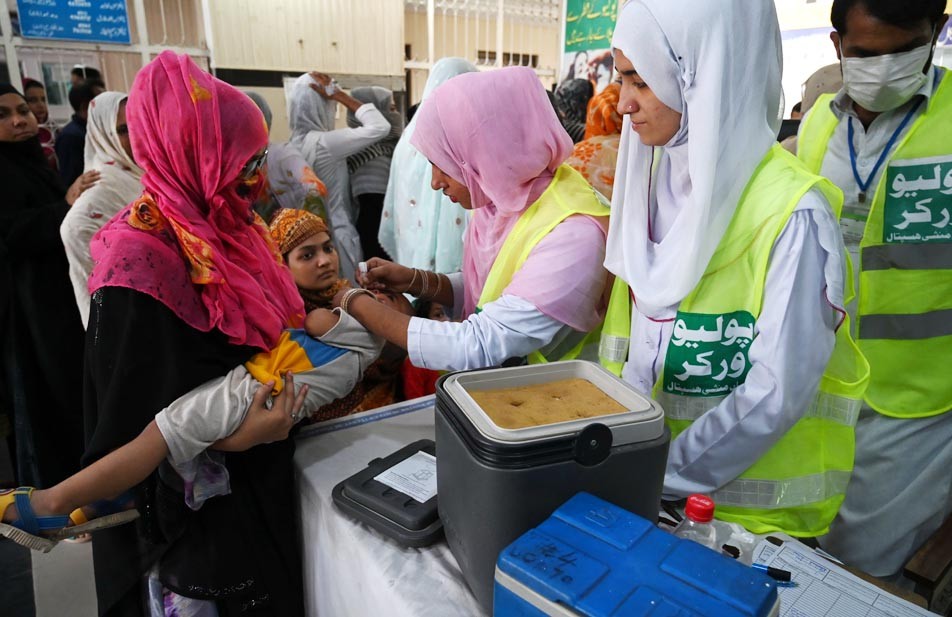
With the number of reported polio cases rising to 76 this year, the goal of making Pakistan polio-free by 2020 seems unrealistic

Till last week, the number of polio cases reported in Pakistan in 2019 had risen to a staggering 76. There is no reason to doubt that it will rise further by the end of the year.
14 months of the PTI government have seen an upsurge in polio cases - the worst in four years. In 2018, the number of cases reported was 12; in 2017, eight; in 2016, 20; and in 2015 it had dropped from 306 to 54.
According to the World Health Organisation (WHO), by 2017 Pakistan’s polio eradication programme had registered an overall 97 percent drop in wild poliovirus cases. Now, with the figure rising to 76, the trend has clearly reversed. In the last seven days alone, three new cases have been identified -- two in Lakki Marwat, Khyber Pakhtunkhwa (KP), and one in Harnai, Balochistan.
Babar bin Atta, prime minister’s focal person on polio eradication, resigned last week due to "personal reasons". He had taken charge in October 2018 after the formation of PTI government.
"I have to admit that there was a communication gap between field workers and the management due to which field workers claimed that they had vaccinated over 99 percent children," he said, while briefing the media after his resignation. He alleged that the previous government had fudged the figures to claim a decline in polio cases and near-complete coverage of routine immunisation.
A month ago, the Pakistan Muslim League-Nawaz (PML-N) criticised the government for the "disaster" the polio eradication programme had turned into and demanded formation of a commission to fix responsibility for increase in the number of polio cases.
A new phase of polio vaccination is expected to begin in the first week of November, mainly to target high-risk zones. The last campaign, held in August, immunised some 7.1 million children in 46 districts of the country.
According to WHO, there are 103 ‘stronghold’ areas in the country. Of the 76 cases this year, some 55 have been identified in KP - 23 in Bannu, 9 in Lakki Marwat and 8 in North Waziristan.
Ayesha Raza Farooq, the PML-N senator and focal person for polio eradication between 2013 and 18, says that the PTI government is using the polio eradication programme for personal glorification and political gains -- "such programmes should be apolitical," she says.
She adds that during her tenure a systematic and integrated policy was followed to eradicate polio and enhance coverage of polio immunisation. For the success of the programme, she suggests, "accountability, monitoring and evaluation", and a team of technical experts "who are able to set aside political considerations".
Due to the increase in polio cases, the WHO has once again recommended restrictions on passengers travelling abroad. The International Health Regulations (IHR) Emergency Committee of the WHO has reviewed the data on wild poliovirus (WPV1) and circulating vaccine derived polioviruses (cVDPV), and has decided to recommend restrictions on passengers travelling abroad without poliovirus vaccination certificate.
If these WHO-recommended restrictions are imposed, passengers who fail to produce a polio vaccination certificate at the time of travel will not be permitted to leave the country.
In 2014, the WHO had recommended strict travel restrictions on Pakistan due to the rising number of polio cases in the country. It had also recommended that persons travelling abroad should present a polio vaccination certificate. Resultantly, Pakistan had to set up mandatory polio immunisation points at international airports. However, with the passage of time, the authorities became lax about enforcing this restriction.
"We were hoping to make Pakistan free of polio by 2020. We now feel that it has become difficult to meet this challenge," says Dr Tariq Iqbal Bhutta, a former advisor to WHO on polio eradication.
He says in the present situation there are fears of increase in polio cases. "Such surges need immediate and prompt action with a focused strategy in the high-risk zones. Unluckily, we have been unable to manage that. Even Afghanistan and Nigeria are now doing better than Pakistan."
He says Iran and Oman have 100 percent coverage of routine immunisation.
Pakistan has managed to cover only 40 percent of Sindh, 80 percent of the Punjab, 30 percent of Balochistan and 60 percent of the KP. "The government should focus on coverage to avoid further risks," he adds.
Dr Zafar Mirza, special assistant to prime minister on National Health Services, Regulations and Coordination, promises to make Pakistan polio-free -- "We believe such causes and campaigns are beyond individuals. My office has taken charge of the polio eradication campaign to avoid laxity."
He adds, "The rise in polio cases was predicted by international bodies before this government took charge. An independent board of polio monitoring had predicted a downhill situation in the previous reports."